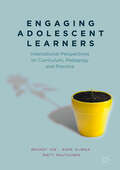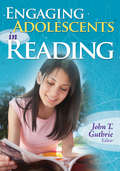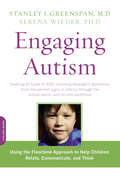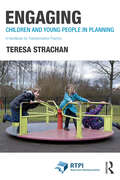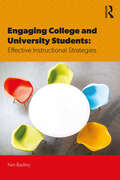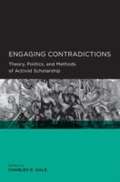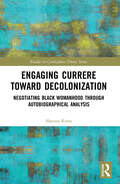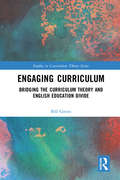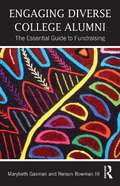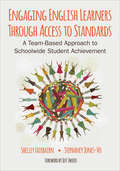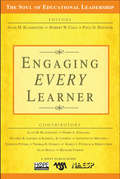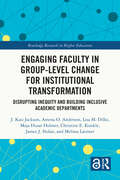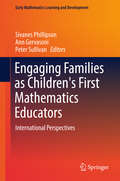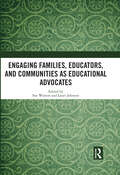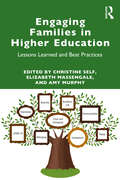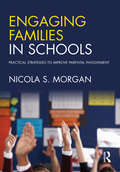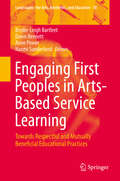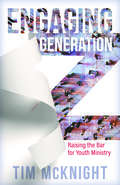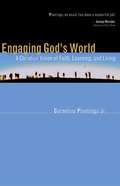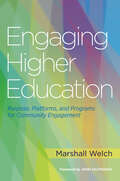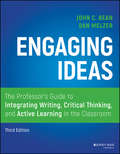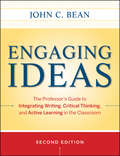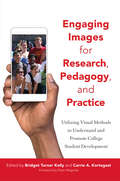- Table View
- List View
Engaging Adolescent Learners: International Perspectives on Curriculum, Pedagogy and Practice
by Brandy Yee Anne Sliwka Matti RautiainenThis book draws on detailed case studies from three very different countries and school systems to explore the early adolescent learner and the middle years of learning, both of which are often overlooked in the literature. An abundance of research shows the importance of the middle years in putting early adolescent learners on the path to success in further education, careers, and general wellbeing. By focusing on bringing current research to life through the sharing of practical examples and lived experiences of practitioners, this book explores how issues such as curriculum reform, inclusive philosophies, instructional design, and assessment practices are supporting the conditions in which effective middle years learning can unfold. A comparative approach, using data from Canada, Germany and Finland, is utilized to critically examine the effects of the pedagogical methods employed by teachers, and the learning environments in which formal education takes place. The book makes a compelling case for the importance of fostering student voice and choice, and developing new ways of engaging the school community as a whole, and makes a valuable contribution to the discourse concerning early adolescent learners and the middle years of schooling.
Engaging Adolescents in Reading
by John T. GuthrieWith contributions from content teachers, this insightful book discusses instructional approaches, student activities, and textbooks that can motivate reluctant learners to become active readers.
Engaging Autism: Using the Floortime Approach to Help Children Relate, Communicate, and Think (A Merloyd Lawrence Book)
by Stanley I. Greenspan Serena WiederGrateful parents and professionals worldwide have welcomed this essential guide to the highly recommended Floortime approach for treating children with any of the autism spectrum disorders (ASD). Now available in paperback, Engaging Autism includes new, exciting information on neuroscience research into the effects of this approach, plus guidance for parents navigating the controversies surrounding the treatment of autism. Unlike approaches that focus on changing specific behavior, Greenspan’s program promotes the building blocks of healthy emotional and behavioral development. He shows that, remarkably, children with ASD do not have a fixed, limited potential, and may often join their peers to lead full, psychologically healthy lives. The Floortime approach can also be applied at any age--including early infancy, when the first signs of risk for ASD may appear--so that preventing the full development of autism becomes a real possibility.
Engaging Children and Young People in Planning: A Handbook for Transformative Practice (ISSN)
by Teresa StrachanEngaging Children and Young People in Planning places planners’ skills for engagement with children and young people centre stage by discussing several projects delivered or supported by planning students to young people in the Northeast of England. Urban or town and country planning is a largely unfamiliar concept to children and young people. Moreover, in England, the environment in which young people live, play and go to school is shaped by a local planning process which lacks their input. This book explores the nature of the gap between that planning process and the voice of the younger members of the community, as well as the barriers that impede this engagement. It highlights why an engagement process is beneficial for those young people, for the wider community and for the planning process itself. At a time when our relationship with and impact on, the environment is being re-examined, this book challenges the planning professional to identify, develop and reflect upon the engagement skills that will help to transform planning into a more inclusive practice. It will be of use to scholars and practitioners in urban planning, community planning, engagement and children’s rights, whilst supporting their academic and professional development pathways.
Engaging College and University Students: Effective Instructional Strategies
by Ken BadleyEngaging College and University Students outlines creative and effective course organization and teaching-learning strategies for higher education courses. By describing specific instructional best practices, rather than addressing general questions about teaching in higher education, the author presents a valuable resource for educators to consult in the moment. The author explores the challenges of engaging students in online settings and draws comparisons with face-to-face strategies of engagement. By organizing the strategies according to course progress, and offering corresponding rubrics for assessment, this guide for instructors offers a solid foundation for an ever-changing teaching and learning landscape.
Engaging Contradictions: Theory, Politics, and Methods of Activist Scholarship
by Charles R. HaleThe primary purpose of this volume is to provide a broad and grounded counterpoint to the standard admonition to students entering social science and humanities graduate training programs: "Welcome, come in, and please leave your politics at the door."
Engaging Currere Toward Decolonization: Negotiating Black Womanhood through Autobiographical Analysis (Studies in Curriculum Theory Series)
by Shauna KnoxThis timely volume uniquely illustrates how currere can be applied to the process of decolonizing subjectivity. Centered around the experiences of one black woman from the third world, the text details the theoretical underpinnings of Currere towards Decolonizing (CTD), and walks the reader through the autobiographical analysis involved in dismantling cognitive colonization. Conceived as a four-part autobiographical process of remembering, identifying, imagining, and decolonizing, the method of CTD is demonstrated as a means of recognizing and reflecting on how the colonial project has been internalized, and of gradually dismantling the psychological, affective, and material impact of colonization. Using both theoretical and experiential standpoints, and intersecting with notions of anti-blackness, linguicide, and Africana womanhood, the volume moves curriculum theory urgently towards anti-colonial mechanisms that disrupt the colonizing process. This text will benefit researchers, academics, and educators in higher education with an interest in curriculum studies, post-colonialism, and Black studies more broadly. Those specifically interested in interpersonal psychoanalysis, as well as gender and third world studies, will also benefit from this book.
Engaging Curriculum: Bridging the Curriculum Theory and English Education Divide (Studies in Curriculum Theory Series)
by Bill GreenExplicitly linking curriculum inquiry to English education via recurring themes of representation, democracy and knowledge, this book is a call for both researchers and practitioners to engage with curriculum, explicitly and deliberatively, as both a concept and a question. The approach is broadly conceptual and constitutes an exercise in theoretical and philosophical inquiry. While deeply informed by North American debates and developments, this book offers a distinctive counterpoint and a strategically ‘ex-centric’ perspective, being equally informed by the curriculum scene in Australia, as well as the UK and elsewhere. Divided into two sections, this book first addresses matters of general curriculum inquiry, while the second turns more specifically to English teaching and to associated questions of language, literacy and literature in L1 education. Green brings the two together through a critical examination of the Australian national curriculum, especially in its implications and challenges for English teaching, and with due regard for the project of transnational curriculum inquiry.
Engaging Diverse College Alumni: The Essential Guide to Fundraising
by Marybeth Gasman Nelson Bowman IIIWinner of the 2014 CASE Warwick Award for Outstanding Research on Alumni Relations and Institutional Advancement Changing demographics are having a substantial impact on college and university student populations. In order to continue garnering funds and supporting their higher education institutions, development offices and individual fundraisers need to learn more about alumni of color. To help move fundraising staff away from a "one size fits all" approach, Engaging Diverse College Alumni provides a comprehensive overview of philanthropy in diverse cultures. Unlike other works on fundraising within communities of color, this book focuses specifically on college and university alumni and offers concrete suggestions for engaging these populations, including best practices as well as approaches to avoid. This practical guide includes: A Comprehensive Overview of Diverse Cultures—use of secondary sources, interviews, and quantitative data to explore the history, motivations, and trends of Latino, African American, Native American, and Asian American and Pacific Islander communities. Practical Recommendations—data-based recommendations and examples integrated throughout the chapters, including "Strategies at a Glance" for quick reference. Best Practices and Innovative Approaches—interviews with advancement staff and alumni of color, an entire chapter outlining successful innovative fundraising programs, and a chapter on common pitfalls to avoid. Both newcomers and seasoned fundraising professionals will find this book to be a compelling and in-depth guide to engaging diverse college alumni.
Engaging English Learners Through Access to Standards: A Team-Based Approach to Schoolwide Student Achievement
by Dr Michele B. Fairbairn Stephaney Jones-VoUse this six-part strategy for measurable, cross-curricular EL achievement! Expert research, instructive tables and templates, essays, and real-life stories illuminate best practices for cross-curricular, standards-based instruction that gets results. Using the authors’ six-part ENGAGE Model, you’ll learn to: Establish a shared vision for serving ELs Name the expertise to utilize within collaborative teams Gather and analyze EL-specific data Align standards-based assessments and grading to ELs’ linguistic and content development Ground standards-based instruction in both content and language development Examine results to inform next steps Use this groundbreaking guide for measurable EL progress!
Engaging English Learners Through Access to Standards: A Team-Based Approach to Schoolwide Student Achievement
by Dr Michele B. Fairbairn Stephaney Jones-VoUse this six-part strategy for measurable, cross-curricular EL achievement! Expert research, instructive tables and templates, essays, and real-life stories illuminate best practices for cross-curricular, standards-based instruction that gets results. Using the authors’ six-part ENGAGE Model, you’ll learn to: Establish a shared vision for serving ELs Name the expertise to utilize within collaborative teams Gather and analyze EL-specific data Align standards-based assessments and grading to ELs’ linguistic and content development Ground standards-based instruction in both content and language development Examine results to inform next steps Use this groundbreaking guide for measurable EL progress!
Engaging EVERY Learner
by Alan M. Blankstein Robert W. Cole Paul D. HoustonJoin today's most insightful thinkers as they explore the heart, mind, and soul of educational leadership! This concise volume offers educational leaders key concepts and strategies for framing discussions about closing the equity gap and ensuring high achievement for all learners. As the first volume in The Soul of Educational Leadership series, this unique collection presents: Contributions from Pedro Noguera, Thomas Guskey, Richard Farson, Alan Boyle, Antoinette Mitchell, Stephen G. Peters, Randall & Delores Lindsey, Karen Pittman & Merita Irby, and Alan M. Blankstein Thought-provoking ideas applicable to all schools, districts, and learning communities A complete index for browsing and referencing across topics
Engaging Faculty in Group-Level Change for Institutional Transformation: Disrupting Inequity and Building Inclusive Academic Departments (Routledge Research in Higher Education)
by J. Kasi Jackson Amena O. Anderson Lisa M. Dilks Maja Husar Holmes Christine E. Kunkle James J. Nolan Melissa LatimerDiversifying the academic faculty remains an elusive goal marked by slow and uneven progress. This book describes an effective model for institutional transformation which is uniquely grounded in group-level processes. Efforts at institutional transformation continue to center individual actors. This is evident in the proliferation of programs that train individuals on implicit bias, search strategies, and other diversity and inclusion-based content as solutions for inequities in academia. Acknowledging the value of these approaches, this book adds a new focus: group-level processes. It unifies research on gender and racial inequity with concepts from social psychological theories of group dynamics to present a model of change centered on professional adult learners, including faculty and academic staff. The book details the implementation of group-level processes based on insights from the learning sciences, higher education leadership, communication studies, and group facilitation to instill norms for a more equitable and inclusive institution. Drawing on quantitative and qualitative data to illustrate the impact of group-level initiatives, the book offers recommendations to enable the application of this model in higher education contexts. This book will be of interest to researchers and graduate students studying institutional transformation, academic social justice leadership, and faculty professional development and to those interested in integrating justice and equity into team science, translational research, and other trans-, inter-, and multi-disciplinary fields.
Engaging Faculty in Group-Level Change for Institutional Transformation: Disrupting Inequity and Building Inclusive Academic Departments (Routledge Research in Higher Education)
by J. Kasi Jackson Amena O. Anderson Lisa M. Dilks Maja Husar Holmes Christine E. Kunkle James J. Nolan Melissa LatimerDiversifying the academic faculty remains an elusive goal marked by slow and uneven progress. This book describes an effective model for institutional transformation which is uniquely grounded in group-level processes.Efforts at institutional transformation continue to center individual actors. This is evident in the proliferation of programs that train individuals on implicit bias, search strategies, and other diversity and inclusion-based content as solutions for inequities in academia. Acknowledging the value of these approaches, this book adds a new focus: group-level processes. It unifies research on gender and racial inequity with concepts from social psychological theories of group dynamics to present a model of change centered on professional adult learners, including faculty and academic staff. The book details the implementation of group-level processes based on insights from the learning sciences, higher education leadership, communication studies, and group facilitation to instill norms for a more equitable and inclusive institution. Drawing on quantitative and qualitative data to illustrate the impact of group-level initiatives, the book offers recommendations to enable the application of this model in higher education contexts.This book will be of interest to researchers and graduate students studying institutional transformation, academic social justice leadership, and faculty professional development and to those interested in integrating justice and equity into team science, translational research, and other trans-, inter-, and multi-disciplinary fields.Chapter 2 of this book is freely available as a downloadable Open Access PDF at http://www.taylorfrancis.com under a Creative Commons [Attribution-Non Commercial-No Derivatives (CC-BY-NC-ND)] 4.0 license.
Engaging Families as Children's First Mathematics Educators
by Sivanes Phillipson Ann Gervasoni Peter SullivanThis book explores how professionals can engage and inspire parents to support their young children's mathematics learning. Bringing together international experts, researchers and scholars, it proposes a framework for engaging with and supporting parents, including those who are less aware of the crucial development of children's mathematical skills in the early years. Focusing on mathematics learning from birth to 5 years, the book's underlying assumption is that it is possible to offer guidance to professionals working with families with young children concerning how to engage and support families in the area of mathematics learning, including those families who seem alienated from education services. Specifically, the respective chapters present a framework for understanding children's early mathematical development and the important role of families in this regard. They describe effective strategies for engaging families in their children's mathematics learning, including those who are marginalised and experience multiple disadvantages, so that all families can best support their children's mathematical learning and their development of positive attitudes towards learning. In closing, hurdles and opportunities within the systems surrounding family engagement are addressed.
Engaging Families, Educators, and Communities as Educational Advocates
by Sue Winton Lauri JohnsonThis edited collection broadens understanding of family–school–community partnerships by focusing on how community groups, educators, and university professors engage with public education to achieve their own goals rather than goals defined by schools, school systems, and governments. Authors critically examine various school–community partnerships that collectively aim to improve decision-making, democratize policy processes, resist policies that support the marketization of public education, and advocate for racial equality. The book’s chapters focus on advocacy efforts within and across three national contexts—England, Canada, and the United States. Together they expand current scholarship by demonstrating how different constituencies develop alliances, experience tensions, and navigate the politics inherent in change efforts. By examining the intersections of parent and community organizing, teacher unions, and school–community partnerships across national contexts, the chapters uncover fruitful new terrain for understanding the theory and practice of educational activism. This volume was originally published as a special issue of Leadership and Policy in Schools.
Engaging Families in Higher Education: Lessons Learned and Best Practices
by Christine Self Elizabeth Massengale Amy MurphyIn today’s colleges and universities, parents and families are increasingly important as partners to support students in enrolling and navigating the college experience. Tailored to higher education professionals who work with the families of college students, this book provides a solid foundation for establishing or enhancing parent and family initiatives across the institution and how to partner with families to foster student success. The chapter authors, seasoned professionals working in higher education, share best practices and relevant research related to partnering with families and addressing challenges that come with engaging families. Chapters also explore ways to make parent and family programming accessible for first-generation families and families from underrepresented groups who may often feel left out of traditional activities, programs, and services. Chapters feature "Voices from the Field" sharing best practices as well as "Tough Talks" breaking down some of the more difficult interactions between families and students and staff. This book is a valuable resource to higher education and student affairs professionals seeking to strengthen their work with families in order to better support student success in college.
Engaging Families in Schools: Practical strategies to improve parental involvement
by Nicola S. MorganEngaging Families in Schools is a practical resource that provides strategies and ideas that will contribute to the effective engagement of families and the involvement of parents in their child’s education. Parental engagement with school staff has a significant and very positive impact on children’s learning, and strategies presented have been extensively trialled in a variety of different settings. Nicola S. Morgan shows school staff how to understand the importance of family engagement and evidence the outcomes. This book has been split into ten easily accessible units: Understanding the importance of parent engagement Using whole-school strategies to engage parents The role of the family engagement officer Engaging all parents Engaging Dads Engaging multicultural parents Difficult to engage parents Working with parents to improve student attainment Working with parents to improve behaviour and attendance Working with parents of children with additional needs This is a must-read guide for teaching and non teaching staff who wishes to bridge the gap between their student’s school and family life and understand the effects of positive family engagement.
Engaging First Peoples in Arts-Based Service Learning
by Brydie-Leigh Bartleet Dawn Bennett Anne Power Naomi SunderlandThis volume offers educators, higher education institutions, communities and organizations critical understandings and resources that can underpin respectful, reciprocal and transformative educative relationships with First Peoples internationally. With a focus on service learning, each chapter provides concrete examples of how arts-based, community-led projects can enhance and support the quality and sustainability of First Peoples' cultural content in higher education. In partnership with communities across Australia, Aotearoa New Zealand, Canada and the United States, contributors reflect on diverse projects and activities, offer rich and engaging first-hand accounts of student, community and staff experiences, share recommendations for arts-based service learning projects and outline future directions in the field.
Engaging Generation Z: Raising the Bar for Youth Ministry
by Tim McKnightA holistic approach to reaching Generation Z in your local churchTo disciple the youth in our student ministries today, we have to understand the unique characteristics of Generation Z, and apply lessons learned from recent decades of youth ministry. In this thoroughly revised second edition of Raising the Bar: Student Ministry for a New Generation, pastor and professor Timothy McKnight brings a wealth of new insights, resources, and guidance for reaching today's adolescents.Following an overview of the beliefs, attitudes, and practices of Generation Z, McKnight provides youth pastors and volunteers with a complete plan for discipling adolescents through the local church. This includes practical advice on topics such as:• Engaging parents in youth ministry• Holistically guiding students in their beliefs, behavior, and affections• Equipping adult leaders who can serve as role models• Working with pastors, staff, and church leaders• Helping parents develop rites of passage for their children as they move into adulthood• Raising expectations for adolescents to encourage them to grow toward maturityBased on years of personal experience and practice, Engaging Generation Z provides everything youth ministers need to equip, grow, and encourage today's generation of young people to follow Christ, and to take their student ministry to the next level.
Engaging God's World: A Christian Vision of Faith, Learning, and Living
by Cornelius Plantinga Jr.The Bible admonishes Christians to love God with the mind as well as with the heart. Engaging God's World clearly links this scriptural mandate with the pursuit of academic life, extolling the crucial role of Christian higher education in the intellectual and spiritual formation of believers. Chiefly intended to serve as a primer for students beginning college careers but valuable to thoughtful Christians at every stage of life, this volume spells out the central themes of the Christian faith from a Reformed perspective. More important, however, the book shows how Christian higher education fits inside a view of the world and of human life that is formed by these ideas. "Learning," Cornelius Plantinga writes, "is a spiritual calling; properly done, it attaches us to God." Approaching the topic of education from a variety of angles, Plantinga shows that Christ-centered learning teaches people to correctly see the world as God's creation, to see providence in history, to handle secular knowledge critically, to develop good judgment and, ultimately, to use faith-filled learning in the service of God's kingdom.
Engaging Higher Education: Purpose, Platforms, and Programs for Community Engagement
by Marshall WelchCo-published with For directors of campus centers that have received the Carnegie Classification for Community Engagement, this book offers research and models to further advance their work. For directors starting out, or preparing for application for the Carnegie Classification, it provides guidance on setting up and structuring centers as well as practical insights into the process of application and the criteria they will need to meet.Building on the findings of the research undertaken by the author and John Saltmarsh on the infrastructure of campus centers for engagement that have received the Carnegie Classification for Community, this book responds to the expressed needs of the participating center directors for models and practices they could share and use with faculty, and mid-level and upper-level administrators to more fully embed engagement into institutional culture and practice.This book is organized around the purpose (the “why”), platforms (the “how”), and programs (the “what”) that drive and frame community engagement in higher education, offering practitioners valuable information on trends of current practice based on Carnegie Classification criteria. It will also serve the needs of graduate students aspiring to become the future professoriate as engaged scholars, or considering preparation for new administrative positions being created at centers.
Engaging Ideas: The Professor's Guide to Integrating Writing, Critical Thinking, and Active Learning in the Classroom
by John C. Bean Dan MelzerUse your course's big ideas to accelerate students’ growth as writers and critical thinkers The newly revised third edition of Engaging Ideas delivers a step-by-step guide for designing writing assignments and critical thinking activities that engage students with important subject-matter questions. This new edition of the celebrated book (now written by the co-author team of Bean and Melzer) uses leading and current research and theory to help you link active learning pedagogy to your courses' subject matter. You'll learn how to: Design formal and informal writing assignments that guide students toward thinking like experts in your discipline Use time-saving strategies for coaching the writing process and handling the paper load including alternatives to traditional grading such as portfolio assessment and contract grading Help students use self-assessment and peer response to improve their work Develop better ways than the traditional research paper to teach undergraduate reading and research Integrate social media, multimodal genres, and digital technology into the classroom to promote active learning This book demonstrates how writing can easily be integrated with other critical thinking activities such as inquiry discussions, simulation games, classroom debates, and interactive lectures. The reward of this book is watching students come to class better prepared, more vested in the questions your course investigates, more apt to study purposefully, and more likely to submit high-quality work. Perfect for higher education faculty and curriculum designers across all disciplines, Engaging Ideas will also earn a place in the libraries of graduate students in higher education.
Engaging Ideas
by John C. Bean Maryellen WeimerLearn to design interest-provoking writing and critical thinking activities and incorporate them into your courses in a way that encourages inquiry, exploration, discussion, and debate, with Engaging Ideas, a practical nuts-and-bolts guide for teachers from any discipline. Integrating critical thinking with writing-across-the-curriculum approaches, the book shows how teachers from any discipline can incorporate these activities into their courses. This edition features new material dealing with genre and discourse community theory, quantitative/scientific literacy, blended and online learning, and other current issues.
Engaging Images for Research, Pedagogy, and Practice: Utilizing Visual Methods to Understand and Promote College Student Development
by Bridget Turner Kelly Carrie A. KortegastThis book introduces practitioners and researchers of student affairs to the use of images as a means to gaining new insights in researching and promoting student learning and development, and understanding the campus environment. Visual research methods can surface and represent ideas in compelling ways and augment the traditional written word and numerical data methodologies of social science research. The purpose of this book is to provide informative, rich examples of the use of visuals to understand and promote college student development research, pedagogy, and practice.With the increased accessibility of cameras, the ability to engage in image production has become widely available. Individual--including college students, faculty, and administrators--narrate the social world in new ways using visuals. While on the one hand students are using images to mobilize around social issues on campus, on the other, institutionally produced visual artifacts send messages about institutional culture and values. In promoting visual literacy, this book offers new opportunities for student development administrators and faculty to utilize the visual sensory modality and image-based artifacts to promote student success and belonging which are critical outcomes of higher education.The book is divided into three sections: research, pedagogy, and practice. The first makes the case for adding visual methods to the researcher’s toolbox, describing past uses and outlining a theoretical approach to visual methods and methodologies in higher education research. The pedagogical section demonstrates different and creative ways for educators to think about how subjects--such as social justice--might be taught and how educators can draw upon new, changing modalities in their existing pedagogies and frameworks; and it illustrates how visual-based pedagogies can prompt students to new understandings about the content of their course of study. The concluding section describes how student development professionals can also utilize visual methods to provide students with out-of-classroom learning opportunities and as a means to stimulate student reflection and identity development. It also explores how visual methods can serve a way for practitioners to reflect on their professional practice and use of theory in their work. Intended for higher education educators, researchers, and practitioners who teach, research, and promote college student development and learning, this book could also be used in student affairs and higher education courses and professional development workshops.
